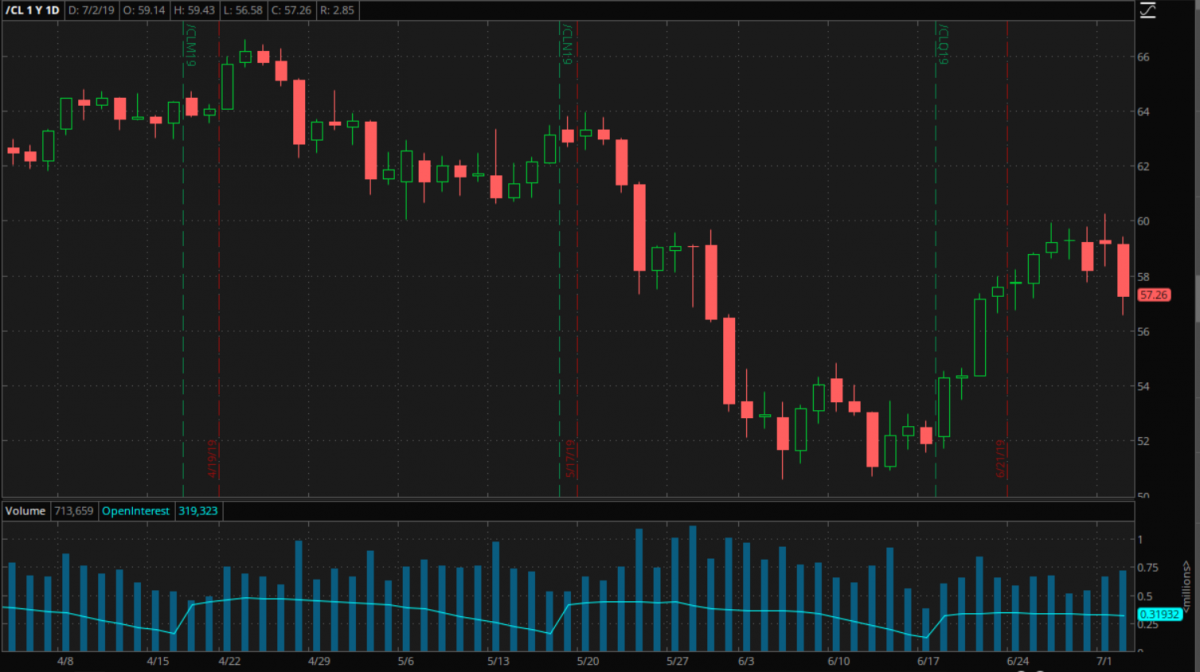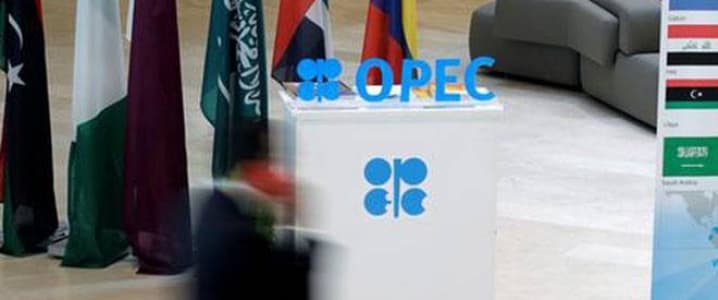Early on Tuesday, following their meeting in Vienna, the Organization of Petroleum Exporting Countries (OPEC) announced a nine-month extension to the existing agreement to limit oil production. The initial deal was reached in 2017 and this will extend the current limits until March of 2020. On its face, this seems like a win for the cartel, especially as agreement was reached at a time of massive divisions and rancor within the group, particularly the Middle Eastern countries that form its core. Look a little deeper into the leadup to the announcement and the overall situation with oil, however, and there is evidence of fundamental changes that could well result in the death of OPEC, at least as an effective cartel.
That is a call that has been made many times and by many people in the past, but so far, to paraphrase Mark Twain, reports of OPEC’s death have been greatly exaggerated. It should be noted, however, that while that was true at the time he said it, Twain did eventually die. Death, whether of a person or an organization, is rarely sudden and unexpected. It usually comes following a series of small events that weaken and diminish the body, and it could be argued that the negotiations that led to today’s announcement, the circumstances surrounding it, and the market reaction to it all fit that description.
First and foremost, one of the most important parties to the negotiations is not even an OPEC member. The deal was based on a pre-meeting agreement between Saudi Arabia, always the de facto leader of the cartel due to its position as the biggest oil producer, and Russia, which is part of the group known as OPEC+ that came up with the original plan. They are not, however, an OPEC member. The fact that the Saudis felt it necessary to reach agreement with a non-member before taking the proposal to the meeting speaks volumes about where the power now lies. Related: China Just Created A Huge Opportunity For The Oil & Gas Industry
The expansion of fracking and the technology that has enabled it has changed the industry in many ways, but one of the most significant is that it has reduced the power of even a mega-producer like Saudi Arabia to influence prices. The world’s recoverable oil reserves have been massively increased and production from those reserves can now be switched on and off quicker than ever in response to price fluctuations. Countries such as the U.S. and Canada where price is the driver of output have therefore taken on more importance, and even an OPEC proposal designed to simply hold prices steady now needs outside support.
Going into this weekend’s meeting, the biggest obstacle to agreement was thought to be Iran. That made sense based on their bitter feud with the Saudis that has escalated to actual war in the region, albeit by proxy. The theory was that they would oppose anything that the Saudis proposed, regardless. As it turned out though, in the battle between enmity and practicality for the Iranians, practicality won. With U.S. sanctions on Iranian oil biting ever deeper, Iran’s output is limited anyway. In those circumstances, limiting the oil production of others to prop up prices cost them nothing and potentially gained them a lot.
That is the kind of hard-nosed, economic decision that has been OPEC’s strength in the past. Hostility and fighting are nothing new in the region, but the mutual interest in controlling oil has always prevailed. The problem is that if concerted action, even with the help of non-members, can do no more than offset market-based supply fluctuations elsewhere, that mutual interest is weakened, and using oil as a weapon in regional disputes becomes a more attractive proposition. Related: OPEC’s Future Looks Bleak As It Extends Deal
I am, as I’m sure many readers are, old enough to remember a time when mention of OPEC struck fear into the hearts of every trader, investor and politician in the developed world. During the 1970s and 80s, as the group flexed the political muscle that comes with economic power, every word that came out of an OPEC meeting had weight and violent, sustained swings in oil, and even in the stock market, inevitably followed any announcement. This, however, was different.

The news has been greeted by the biggest drop in oil for a month or so. Normally that could be put down to a “buy the rumor, sell the fact” kind of pattern, but a couple of weak days coming in will have dampened that effect in this case. It is therefore hard to conclude anything other than that traders are singularly unimpressed with OPEC’s attempt at price support.
That, the need to get buy-in from a non-member before acting at all, and the diminishing returns from burying the hatchet in pursuit of economic advantage all point to one thing. OPEC is still alive, but as it approaches sixty years of age, things are starting to go wrong, and we may now be witnessing the beginning of the end of its natural life.
By Martin Tillier for Oilprice.com
More Top Reads From Oilprice.com:
- The Dark Outlook For Non-OPEC Oil
- Chinese Scientists Find New Way To Clean Up Oil Spills
- OPEC+ Fails To Reassure The Oil Market



















How could OPEC be a cartel when it was founded as a counterweight against the previous “Seven Sisters” cartel which dominated every aspect of global oil through price fixing, limiting supplies and suppressing competition for the sole purpose of maximizing its profits.The main purpose behind the founding of OPEC was to give producers more control over their own oil.
A cartel is defined as an association of manufacturers and suppliers whose goal is to increase their collective profits by means of price fixing, limiting supply, preventing competition or other restrictive practices.
When it comes to limiting oil supply, a true cartel like the “Seven Sisters” was able to do exactly that because it was virtually in control of global oil resources. OPEC has never been in such a situation. It only accounts for 42.6% of the global oil market with the rest of the oil-producing nations of the world accounting for 57.4%.
When OPEC was founded in Baghdad in 1960, its constitution stipulated that its raison d’etre is to defend the rights of its members by ensuring a stable global oil market and stable prices. That is exactly what OPEC has been doing for the last 59 years and will continue to do so.
The second mistake the author has made is to claim that “we are now witnessing the beginning of the end of OPEC”. Whether by wishful thinking or otherwise, he is deluding himself about the end of OPEC. Little did he know that since its founding almost 60 years ago, the influence of OPEC has closely followed the peaks and valleys of the world's demand for oil and its existence was characterized by embargo, conflict, and even war and still it has survived.
Though the fundamentals of the global oil market have been robust since the end of of 2018 as evidenced by the fact that global oil consumption has risen by 1.4 million barrels a day (mbd) in 2018 over 2017 and is projected to grow by a similar amount this year, there has been uncertainty in the global economy over the escalating trade war between the US and China. Sooner or later, President Trump will come to his senses and end the war as it is hurting the US economy far more than China’s. Such a prospect could push oil prices beyond $70 a barrel.
And though currently isolated from decision-making inside OPEC, Iran is a pillar of OPEC and can’t be ignored for ever. Moreover, relations between Iran and Saudi Arabia will eventually return to normal when Saudi Arabia realizes that it will pay a heavy price eventually for joining the US-Israel axis against Iran. Saudi Arabia is well advised to withdraw from the US-Israel axis and try to reach some sort of understanding with it. That could save the Gulf region a damaging war involving the whole Gulf, Israel and US geopolitical interests throughout the Middle East. Such a view has been promoted time and again by the Sultanate of Oman. Surprisingly, Saudi Arabia could find that it has more common grounds with Iran than with the US-Israel axis particularly in oil policies and oil prices inside and outside OPEC.
And while Russia as a highly diversified economy could live with an oil price of $40 a barrel or less, President Putin who is the most astute statesman on the international arena currently decided to support an extension of the OPEC+ production cut agreement for nine more months in order to help Saudi Arabia reach a deal inside OPEC, consolidate his strategic relations with Saudi Arabia and iron out any conflict of interests inside OPEC between Iran and Saudi Arabia. Through his cooperation with OPEC, he has assumed a great influence on OPEC and the global oil market and has even become the arbiter of disputes inside OPEC.
Dr Mamdouh G Salameh
International Oil Economist
Visiting Professor of Energy Economics at ESCP Europe Business School, London